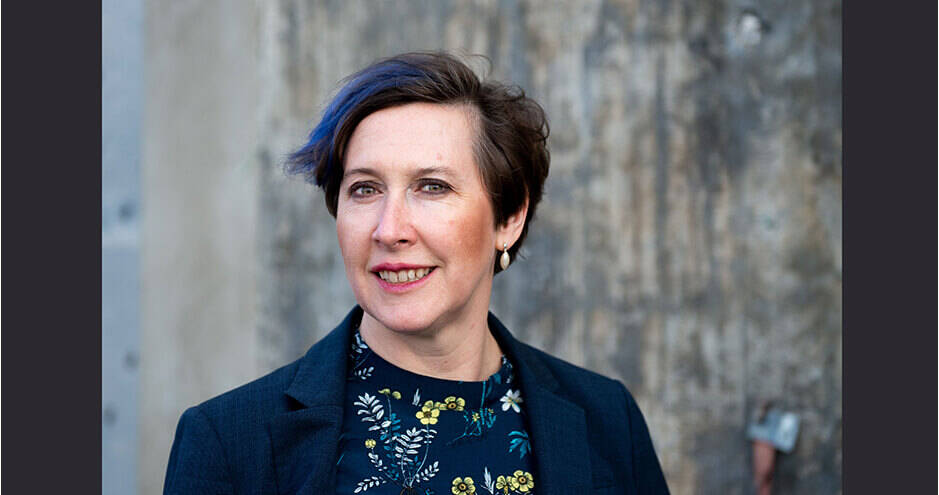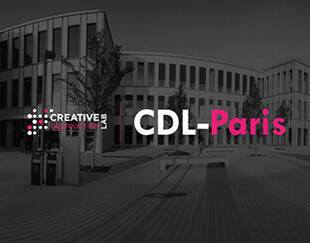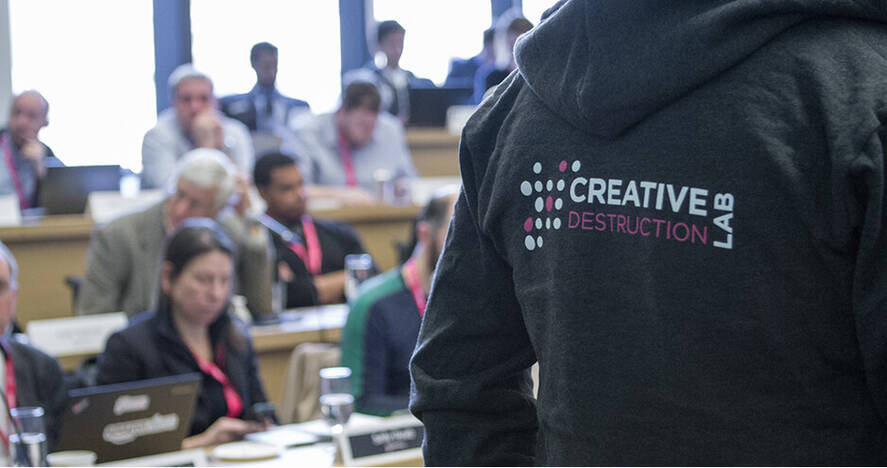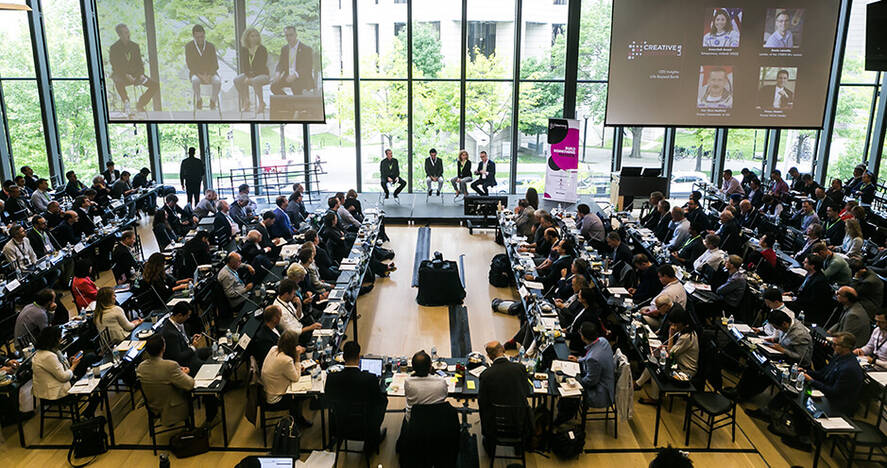Meet CDL Mentor Christine Tovee and her Space Stream Vision
Christine Tovee has had a long and rich career in space and aeronautical projects on both sides of the Atlantic, including a stint as CTO of Airbus Group North America. Currently, she is a consultant for Toronto-based startups on technology road-mapping, strategy and organizational design. She is also a member of the Space Advisory Board of Canada. For the past two years she has been a mentor for the space and blockchain streams for the CDL Toronto program at Rotman Business School, Toronto University. She will begin to mentor for the Creative Destruction Lab (CDL) Paris program which begins in October 2020.

How has your experience as mentor for the CDL at Rotman been so far?
Christine Tovee: It’s been very exciting. This is a period of time we call New Space, where innovative business and new technology is opening up into a much broader and more agile space industry. It’s important to bring people on the technological side (and that is essentially the kind of people space attracts) who have until recently only known government-funded programs. We give a faster paced, more responsive business model to industry through the mentorship network fostered at Rotman and its CDL program. This has really been transformative for the industry.
Transformative?
Yes. The fact that space companies are believing they are venture backable is new. We see people raising capital in firms like Wyvern through capital angel investors and VC funding, rather than government contracts is transforming the industry. Another example is Kepler Communications which is doing very well. When I first met them there was a technological issue that we had been trying to resolve at Airbus Space for decades. They managed find a solution at a very small and agile scale. We are seeing space companies understand their data stream differently, making access to data a very democratic tool. Take, for example, the farmers who are using data from satellite imagery to manage their crops.
CDL is trying to leverage private launch companies where, beforehand, it was the national space agencies and their launch capabilities, which dominated the market (the Big Six). Rotman and the CDL programs have shown that there are agile companies which are capable of competing thanks to their new business models.
Infusing Good Technology with Good Business Practices
You have a long experience of business cultures in North America and Europe. How do you imagine the experience will compare at CDL Paris in terms of business culture?
In some ways, I think it will be similar. The ventures and cohorts have profiles that are very technologically confident with good technological ideas. The core of CDL is to take interesting technology and make a business out of this. I expect my experience to be as challenging and interesting in Paris as it is in Toronto, since the business ecosystems in Europe and North America are similar.
What could be more challenging will be our North American model of going faster, asking cohorts to do more. This is something that is not as usual in Europe: no matter how good you were yesterday, you have to be better today. So, there’s speed… and there is the acceptance of blunt criticism and commentary. You must use these responses to build a better business. In Europe there is more hierarchy and politeness in meetings. The CDL will shake it up a bit.
As a consultant for several Toronto-based startups, you are well versed in sharing your experience in the space industry. How important is it to give back as a mentor?
Well, I certainly enjoy it. It’s also fantastic to see where these young entrepreneurs are in their journey. There is a real open-mindedness in trying out something original. All that’s needed sometimes is a little bit of rigor, giving keys to get the ideas through the processes. I see the benefits of the small agile organization. I help provide a corporate vision on how to repeat a success. It’s not a question of just one achievement, but recurrent accomplishments, making it a sustainable venture. Not just one product, one innovation, but trying to leverage all they do. When you invest one dollar or euro, you need to know what value it brings to your customer and company.
You have been a longtime advocate of more women in technological leadership. Are you seeing positive developments in this field?
Yes, I am, certainly in the mentorship and CDL communities where we are seeing more women, riding high on successful careers, who are now giving back. The CDL runs a very successful high school program where young women are part of sessions, for example shadowing me for a day. They are engaged and have insights and real aspirations for the world we live in. The program allows them to see what the entrepreneurship is like, it’s not just academic work.
Overall, however, there is still some work to do, for example, in bringing in more women, as well as minorities, to CDL as founders of ventures in the program. They are finding it hard to raise capital, we need to increase their representativity in business.
You are also involved in the impact of science and technology on social challenges. How do you feel the CDL contributes to this very topical debate?
In terms of the current crisis, the CDL-Recovery program over the summer, in which I am also a mentor, has done much to take up these challenges. We are looking at the information gap created by the pandemic and addressing the supply-chain and economic recovery crises. The CDL has applied their methodology to real issues provoked by the health crisis: unemployment, the supply chains, keeping the economy going. There is technology out there to help resolve these issues. If we get them to a level of maturity faster, it will impact the level of response.
I see the CDL Paris program in a similar light. Its focus on climate change issues is saying: ‘Here are the big challenges, lets focus our lenses on agile, technologically-based answers which bring value to real people, the stakeholders, customers, and so on’. This is an important and appropriate approach.
During your career, you worked on the Skynet V satellite telecommunications system which, at the time, was the world’s biggest private and public investment partnerships. Do you think this kind of marriage is something for the future?
That’s a good question. The private-public partnership issue is going through a review and renaissance. 10-15 years ago, it was a key mechanism for large projects. This mechanism is now beginning to be challenged.
I think it’s important, there’s still a public role for bringing science to innovation. The CDL takes over from there. Many of these early stage ideas come out of university laboratories, having received government innovation grants, which make them investable. The relationship between the CDL and public institutions is important. It helps us get to a point where normal capitalism can contribute, take a risk. We are looking at more service models where governments are “anchor” customers. With an “anchor” customer, ventures can generate early revenue projections and convince investors that their innovation is valued by real people; It’s a new way to talk about public-private partnerships.
Related articles


